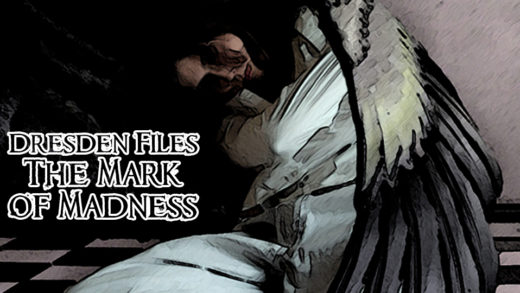When I wrote my Star Wars systems RPG summaries, I also began thinking about different Tabletop RPG rules that focused on player agency, the story of the adventure, and creative/descriptive role-play. Some systems had principles that could be included in almost any other system. This week I look at some dramatic mechanics introduced in various RPG systems.
Mechanics-First to Fiction-First Axis
When discussing the mechanics of tabletop RPGs, the topic of simulation vs. narrative often comes up. There are a few different definitions and interpretations of simulation and narrative games. One of the more popular interpretation on styles of play is the GNS Theory. Personally, I feel the GNS Theory is a too constrictive in its definitions and application and, therefore, fails by being too binary. Or would that be trinary?
Some definitions see the breakdown between simulation and narrative as a rules focus on dice rolls vs a focus on descriptiveness. I prefer this analogy as it makes for an easier sliding scale between various tabletop RPGs and excludes “gameism,” which seems more of a play style than something enforced by a book’s rules. Using the descriptions of Mechanics-First and Fiction-First, this sidesteps any confusion with the GNS Theory definitions and, if one were so inclined, could be used alongside GSN. Rather than one -First “versus” the other, games fall more on a sliding scale. As fiction and mechanics are central to an RPG, no ruleset is completely devoid of both, but some are further along the axis than others.
Mechanics-First systems focus on numbers (stats, skills, points, etc.) to facilitate character definition and actions. Fiction-First systems focus on descriptive phrases and narrative rules to embellish or alter a situation. While there’s nothing stopping descriptiveness in a Mechanics-First system, the further along the Mechanics axis, the numbers speak louder than words. For example, in D&D (primarily a Mechanics-First system), a character with 2 hit points remaining has no loss of skill or specific wounds that prevent any action; in Fate Core (a more Fiction-First system) each “point” of damage represents a descriptive Consequence which directly impacts certain types of actions for a determined period of time.
As an aside, if plotting out a grid of RPG systems Mechanics-First to Fiction-First would be the X-axis. The Y-axis would then be Rules-Heavy to Rules-Light. While a lot of games tend to trend towards Mechanics-First and Rules-Heavy or Fiction-First and Rules-Light, this is not always the case. TWERPS is Mechanics-First but very Rules-Light and Burning Wheel is a Fiction-First game that’s firmly in the Rules-Heavy quadrant.
While any addition of any rules, even Fiction-First options, can make a game more Rules-Heavy it can be worth the trade-off to introduce additional fiction-focused role-play. Especially if one’s games are starting to feel a little too stat-focused.
Removing Unnecessary Rolls
Fiction-First system rules often suggest not rolling if the outcome doesn’t matter or if it could impede the overall story. While I’ve not seen any GM ask characters to make a roll to tie their shoes or get dressed, I have seen GMs request Call of Cthulhu characters or D&D characters to make drive or ride rolls when not in a chase or on dangerous terrain.
Skill rolls in which a positive outcome doesn’t affect anything and in which only a failed roll means something happens are oft-times arbitrary and, more often, useless. They’re tools to make fake problems for the characters but not to advance character growth, player agency, or the scenario’s theme/plot/story. If the desire is to introduce challenges, even if small, avoid making the players roll and simply decide, as a GM, if the car has a flat tire or there’s an issue with the horses’s stirrup.
There are systems which only allow players to advance their characters in a skill by rolling that skill. Call of Cthulhu and Delta Green favor this mechanic. This can lead to a number of forced, unnecessary dice rolls, which can impede the overall progress (and immersion) of a game as players try to roll every skill they have over the course of a game in order to build up their character. One way to remove unnecessary skill rolls while still allowing a character to gain in lesser-used skills is, at the end of the game, have each player roll a d10 and use the result to pick that number of skills the character might have used on the adventure. Or, in the spirit of this article, note what additional skills are used in the overall narrative of the session and allow the players to advance (or the chance to advance) in those likely used, but not rolled, skills.
Motivations and Flaws
Motivations provide a written reason for why the character is involving themselves in an adventure. Beyond the social contract between players and GM, this allows an actual hook that can be used to provide a reason the character is traipsing in dungeons or risking madness fighting unknown horrors. If a Motivation is the positive driving force for a character, the Trouble or Flaw provides a negative spur for why a character might be on an adventure. Incorporating a Motivation and Flaw (each one word to one sentence long) can be an easy way to gain insight for both the GM and player into the characters.
Traits and Techniques
Many Fiction-First systems also include one to six additional one word to one sentence long descriptions that define the character beyond stat and skill points. These Traits (as seen in Fate) or Techniques (as used in the PDQ# system like Swashbucklers of the 7 Skies) can define what a character is good at, bad at, how they best utilize a particular skill (such as “flashy fighting style”), or provide additional motivation to their character. Mechanically, using the Traits or Techniques can provide a bonus to a type of skill when paired with a player-narrated use.
Scene Points
The Ubiquity system (Hollow Earth Expedition, All for One: Régime Diabolique, Leagues of Adventure) grant “Style Points” and the various Fate systems (Dresden Files, Fate Core, Fate Accelerated) use “Fate Points” to allow the players to increase their roll, re-roll a failed skill, or adjust the story narrative. The more points, the more effective the outcome. For example, a large expenditure of Scene Points may turn the tide of a battle by suggesting one of the Big Bad’s lieutenants had a sudden change of heart.
Without adding any other rules to a Mechanics-First game Scene Points can be gained through providing snacks or supplies, exceptional role-play, or amusing the GM (even out of character). If using Motivations, Flaws, and/or Traits, then Scene Points can also be gained by the GM using those descriptions to make the character’s life harder. If using both Scene Points and Traits/Techniques, then it should require the expenditure of points to gain the any bonus implied by the Trait/Technique.
Descriptive Actions and Injuries
While descriptive actions can be another way to gain Scene Points, having a player describe their action and outcome on its own can be strong method of enforcing player agency and role-playing. The narrative of the players should reflect the mechanics of the roll, but a strong initial narrative could grant bonuses to the roll, even if not using Scene Points.
Similarly, the failed rolls and hits taken by a character could be narrated by the players or discussed between the GM and player to establish a character’s wounds and their severity. In a Mechanics-First system it can prove unwieldy (or unfair) for descriptive injuries to penalize rolls, but when coupled with descriptive actions, it can make for creative solutions in and out of combat. When taking damage, have the player decide where they were hit, based on the percentage of hit points this would help inform the severity of the wound. This may not impact their rolls directly, but should inform the player of how their character takes their next action.
Dark Cloud, Silver Linings
One of the takeaways from systems like Polaris or Genesys (the generic system Fantasy Flight Games uses in their Star Wars tabletop RPGS) is that a success or failure isn’t always a binary ratio. A successful lock-pick may still set off alarms; a failed navigation roll may sill lead the characters somewhere important. This good-with-the-bad/bad-with-the-good outlook is baked into the rules of Genesys. Polaris’s system uses the players to suggest what went wrong (the Mistake) of even a good roll.
This mixed results approach can be incorporated into any game with Scene Points; with the GM granting players scene points to darken a successful roll or players spending Scene Points to positively affect a failed roll. Mixed results can also be implemented without the insertion of any additional rules by examining the measure of a success or failure; a success that’s close to failing may introduce some complications and failing by a few points may still open some doors. This requires narrative practice and can take some getting used to, but I would suggest also allowing the players to describe their mistakes or boons. Offering the player the keys to their success and failures takes away the sting of a bad roll and helps complications be seen as a potentially fun part of the game instead of a burden.



Recent Comments